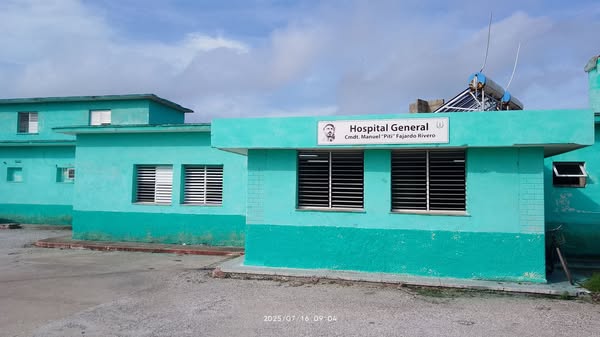August 2025. A necessary introduction: There is a tremendous question, and a truth as big as a hospital, that some, hypocritically, naively, or perhaps with malicious intent, avoid raising or publishing on social media, as if it weren’t the main cause of the shortages and difficulties currently present in the Cuban Public Health system and the rest of the nation’s socioeconomic landscape.
Main question:
How much damage is being caused to this sector by the ironclad and criminal blockade imposed by the United States government on the Cuban people for more than 65 years, intensified to the core by the current Donald Trump administration, with Marco Rubio at his right as Secretary of State and National Security Advisor, clinging to his eternal resentment and morbid hatred against anything resembling the Cuban Revolution?
Development: Any researcher, journalist, or ordinary human being with a real interest in denouncing and disseminating the reality of the public health system in this archipelago, besieged and attacked by every possible means at the hands of Uncle Sam, should consult sources, compare them, verify realities, compare results, and seek the causes of the current situation in hospitals and other levels of Cuban medical care.
Above all, they should organize a set of essential basic questions to generate opinion, including the following:
What interest could the State and local governments have in maintaining the deterioration of a conquest that made Cuba a supreme example of humanism, inclusion, and solidarity worldwide?
How many countries in the world have rejected the imperialist blockade at the United Nations, after hearing in the plenary session of the General Assembly of that global body the Cuban denunciation of the damage caused to the quality of life and rights of millions of citizens of this small Caribbean nation?
Why does the United States persecute, harass, sanction, and threaten companies and financial groups that dare to negotiate with Cuba the sale of medicines, supplies, and medical equipment for the health sector, with proven and publicly known examples?
What is the White House’s intention in its attack against the Cuban Medical Collaboration Program abroad, also recognized as a legitimate source of refinancing intended to sustain health services here? Why do they desperately encourage the desertion of health personnel from carrying out missions in various parts of the world where they save thousands of lives?
Why didn’t some of those who today are staunch critics of the shortcomings that truly impact medical care in Cuba rend their garments when Trump denied this country access to the oxygen needed for patients affected by COVID-19, or in the face of the more than 243 measures adopted by Washington in the last ten years aimed at creating misery, uncertainty, despair, and anxiety among the Cuban population and sowing distrust in its government and in a social system that refuses to view medicine as a commodity, despite the distortions present in this sphere?
How many clinics and hospitals exist in various countries, equipped with cutting-edge resources and technologies, yet they lack the staff to provide the service; or worse, very few of the citizens in their surrounding areas have access to them? Ask Cuban doctors about this!
If our hospitals and clinics are truly in ruins, why do some foreigners and national migrants prefer to return to this island in search of medical treatment for their illnesses or to seek assistance they could receive in the country where they are currently seeking refuge? Why?
The painful reality of the mattress shortage at the Manuel Piti Fajardo Municipal Hospital in Florida, in the province of Camagüey, was recently explained by Dr. Alberto Abascal Santana, director of the institution, who mentioned the aging, deterioration, or forced incineration of a percentage of these resources, as well as the need to systematically sanitize, disinfect, or repair another group to extend their useful life.
The director himself spoke of efforts made with regular suppliers and other private providers in different provinces to acquire new mattresses (the Florida hospital requires more than 100 units of this type), but they collided, he explained, with a lack of raw materials for manufacturing these mattresses.
Healthcare in Florida isn’t just about mattresses:
The reality of the shortages present in some of the health units in the municipality of Florida undoubtedly hurts and worries; however, it hurts even more to know how a group of fellow citizens join in the attack on a sector where pages of loyalty, sacrifice, and effort for others are written every day.
In that same hospital, which today lacks mattresses and is strained by the availability of human resources, complex surgeries, both urgent and elective, are performed every day. Far more important than an IV drip or a suture needle are the intelligence, experience, and love of the surgeons, nurses, and specialists in the operating room.
Hundreds of children and mothers emerge alive from that hospital’s Maternal and Child Care Service each year, cared for by gynecologists, obstetricians, and neonatologists who tirelessly strive to ensure the survival of both, amidst limitations and deficits of all kinds, except for the will to do good and fulfill the Hippocratic oath.
There are men and women working there who also suffer power outages at home, go out to struggle for food every day, and have family responsibilities, but they are capable of putting patients’ demands before personal needs, and that attitude deserves respect in the current situation.
What more can be done to find solutions or do it better? It’s true; in this battle, there can be no respite at all levels in the Public Health System and other decision-making bodies in Florida and throughout Cuba.
That the people demand constant, truthful, and timely information, as well as answers from social actors and institutions obligated to offer them in any space and platform, without fear of explaining the causes of those realities that are so affecting and so evident? It’s also true.
Sometimes we wonder where those public narratives are from authoritative voices beyond a closed meeting or an occasional interview in the press, or from one or two executives willing to offer details and open themselves to questioning in the public forum, as Dr. Abascal himself did in recent days.
But blaming a hospital or a single person for a temporary phenomenon when the root cause is known or hidden is nothing short of defamatory, irresponsible, immoral, and biased.
An indisputable diagnosis:
Let no one doubt it, the pains of bureaucracy and certain manifestations of indolence or lack of drive may coexist right now; but there is certainly more than enough specialists and data to demonstrate that the worst disease embedded in the Cuban Public Health System has a name, and it is called the criminal, genocidal, and hate-filled economic, commercial, and financial blockade imposed, intensified, and extended over time by each of the governments that came to the White House with the purpose of ending the Revolution and bringing a dignified people willing to defend their sovereignty to their knees at any cost.
But they forget an unavoidable principle for this Fidelista alligator: With or without mattresses, no one surrenders here!





